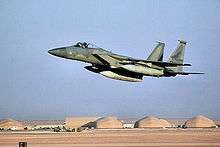Prince Sultan Air Base
| Prince Sultan Air Base قاعدة الأمير سلطان الجوية Al Kharj Air Base | |||||||||||||||
|---|---|---|---|---|---|---|---|---|---|---|---|---|---|---|---|
| IATA: AKH – ICAO: OEPS | |||||||||||||||
| Summary | |||||||||||||||
| Airport type | Military | ||||||||||||||
| Owner | Armed Forces of Saudi Arabia | ||||||||||||||
| Operator | Royal Saudi Air Force | ||||||||||||||
| Location | Al Kharj, Saudi Arabia | ||||||||||||||
| Elevation AMSL | 1,651 ft / 503 m | ||||||||||||||
| Coordinates | 24°03′19″N 047°33′49″E / 24.05528°N 47.56361°ECoordinates: 24°03′19″N 047°33′49″E / 24.05528°N 47.56361°E | ||||||||||||||
| Map | |||||||||||||||
 Prince Sultan Air Base Location of airport in Saudi Arabia | |||||||||||||||
| Runways | |||||||||||||||
| |||||||||||||||
Prince Sultan Air Base (Arabic: قاعدة الأمير سلطان الجوية) (IATA: AKH[3], ICAO: OEPS) (PSAB) is a military air base located in Al Kharj, Saudi Arabia.[1]
History
There was formerly a large United States presence there during Operations Southern Watch, Enduring Freedom and Iraqi Freedom. The U.S. presence was predominantly that of multiple United States Air Force (USAF) flying units, augmented by a United States Navy (USN) or United States Marine Corps (USMC) Northrop Grumman EA-6B Prowler squadron, a Royal Air Force (RAF) fighter squadron with Panavia Tornado F.3s and a French Air Force fighter squadron with Dassault Mirage 2000s, Mirage F1 CR plus a Boeing C-135RF Stratotanker air refueling aircraft. Following the attack on USAF facilities at Khobar Towers in Dharan in 1996, all USAF activities at that location were relocated to PSAB.

Before 11 September 2001, per agreement with the Saudi Arabian government, all U.S. and Allied aircraft stationed at PSAB were to be of a "defensive" versus "offensive" nature. This was due to Arab sensitivities that non-Royal Saudi Air Force (RSAF) aircraft in the Kingdom of Saudi Arabia should be perceived as being there for the defense of the Kingdom.
During Operation Southern Watch, this required aircraft carrying offensive strike ordnance for use against ground targets in Iraq to be stationed in Kuwait or aboard aircraft carriers in the Persian Gulf. USAF, USN, USMC, RAF and French aircraft that were based at PSAB primarily consisted of airborne early warning, reconnaissance, air refueling, electronic warfare, suppression of enemy air defenses (SEAD) and air-to-air fighter aircraft, along with transient airlift aircraft. U.S. squadrons came under the operational control of the 363d Air Expeditionary Wing (363 AEW) at PSAB, with associated squadrons or detachments prior to 11 Sep 2001 rotated in and out from their home bases in Europe, the United States or the Pacific on a 90-day to 6-month basis. During Operation Southern Watch, in addition to Active Component aircraft, the USAF made extensive use of Air National Guard (ANG) and Air Force Reserve Command (AFRC) McDonnell Douglas F-15 Eagle, General Dynamics F-16 Fighting Falcon and Boeing KC-135 Stratotanker aircraft and associated personnel on rotational assignments to PSAB. The United States Navy, Navy Reserve and United States Marine Corps also employed EA-6B aircraft from PSAB as well.
In August and early September 2001, Joint Task Force Southwest Asia (JTF-SWA) and its associated Coalition Air Operations Center (CAOC) were in the process of relocating from the Eskan Village complex in Riyadh to PSAB concurrent with construction of a more modern and expanded CAOC at PSAB. Events of 11 Sep 2001 accelerated this movement, so that subsequent command and control of all Coalition air operations for Operations Enduring Freedom and Iraqi Freedom were executed from PSAB.
In mid-2003, all U.S. operations at PSAB began migrating to Al Udeid Air Base in Doha, Qatar.
Between 2003 and 2005 Vickers VC10s from No. 101 Squadron RAF were based here in support of Operation Telic before moving to RAF Al Udeid (a section of the Al Udeid Air Base in Qatar).[4]
Current use
- RSAF Wing 6:[5]
- No. 18 Squadron RSAF with the Boeing E-3 Sentry Airborne Warning and Control System (AWACS) surveillance aircraft.
- No. 19 Squadron RSAF with the Beech Model 350 Super King Air and the Boeing RE-3A signals intelligence aircraft
- No. 23 Squadron RSAF with the Boeing KE-3A airborne refueller
- No. 24 Squadron RSAF with the Airbus A330-203 MRTT and the Airbus A330-243 MRTT
- No. 32 Squadron RSAF with the Lockheed KC-130H Hercules
Facilities
The air base resides at an elevation of 1,651 feet (503 m) above mean sea level. It has two runways designated 17L/R/35L/R with an asphalt surface measuring 4,000 by 45 metres (13,123 ft × 148 ft).[1]
References
- 1 2 3 Airport information for OEPS from DAFIF (effective October 2006)
- ↑ Airport information for AKH at Great Circle Mapper. Source: DAFIF (effective October 2006).
- ↑ "Airline and Airport Code Search (AKH: Prince Sultan AB, Al Kharj)". International Air Transport Association (IATA). Retrieved 29 September 2012.
- ↑ "19 Years Over Iraq". The Official RAF Annual Review 2010. Stamford: Key Publishing: 11. December 2010. Check date values in:
|access-date=(help); - ↑ "Royal Saudi Air Force - Al Kharj (Prince Sultan Air Base) (OEPS)". Scramble.nl. Retrieved 8 July 2014.
External links
| Wikimedia Commons has media related to Prince Sultan Air Base. |
- Prince Sultan Air Base at GlobalSecurity.org
- Prince Sultan Air Base at CNN